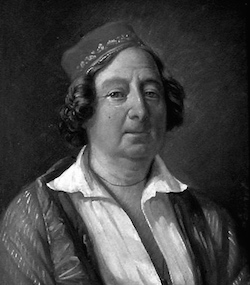General Hippolyte Marie Guillaume de Rosnyvinen de Piré

Born: March 31, 1778
Place of Birth: Rennes, Ille-et-Vilaine, France
Died: July 20, 1850
Place of Death: Paris, France
Arc de Triomphe: PIRÉ on the north pillar
Born into a noble family, Hippolyte-Marie-Guillaume de Rosnyvinen de Piré emigrated with his family to escape the Revolution in 1791. At the start of 1792 he joined the Army of the Princes to serve against revolutionary France but he left the army at the end of the year. Two years later in 1794, Piré joined the infantry regiment of Rohan as a sous-lieutenant in the service of England. He served in Holland and then in 1795 he took part in the Quiberon expedition where he was wounded in the chest. Next he left France on English ships with the Count of Artois before he resigned from the army again. In March of 1796 Piré returned to France to serve in the royalist Army of Vendée. However, he got off to an inauspicious start, being wounded by a bayonet blow to the head during the landing of the troops in Brittany. Nevertheless, he served with the rebels under the orders of Puisaye until July of that year when a peace treaty was signed.
After Napoleon Bonaparte took power in November of 1799, his general amnesty towards émigrés allowed Piré to rejoin the French army. Piré volunteered as a hussar and after the victory at Marengo in June of 1800 he was promoted to capitaine. Piré resigned the following year but when war was declared again in 1805 he rejoined the army. Placed with the staff of the Grande Armée, he served as a capitaine under Colonel Camus and assisted at the Battle of Austerlitz in December. The next year during the campaign against Prussia, Piré entered Leipzig at the head of fifty men. At the end of the year he was promoted to chef d'escadrons in the 10th Hussars, and he went on to serve at the Battle of Eylau in February of 1807. A month after Eylau, Piré was appointed an aide-de-camp to Marshal Berthier. After the victory at Friedland in June, he was then promoted to colonel of the 7th Chasseurs à Cheval.
In 1808 Colonel Piré was sent to Spain with his men and he was also created a Baron of the Empire. At Somosierra that November he resumed his functions as an aide-de-camp to Berthier. The next year Piré was placed with Bordessoulle's brigade and then promoted to général de brigade before the Danube campaign of 1809 began. For the Danube campaign, Piré was appointed commander of the 2nd Brigade in Montbrun's cavalry division in the Grande Armée in Germany. That April he fought at Tengen, Schierling, Eckmühl, and Ratisbon, and then in May he fought at Ebersberg. Next he was placed with Lasalle's division and he served with them at the Battle of Aspern-Essling and the Battle of Wagram .
In 1810 Piré was sent to serve with the French forces serving in Holland. The following year he was assigned to the corps of observation of the Elbe, and then for the Russian campaign of 1812 he took command of a brigade of light cavalry of General Bruyère's division in the Cavalry Reserve. Serving throughout the campaign of 1812, Piré's most notable action was at Ostrowno in July. After surviving the retreat, he served in the army in Germany throughout the campaigns of 1813. At the Battle of Leipzig in October of 1813, Piré was promoted to général de division and given command of the 9th Light Cavalry Division of Milhaud's V Cavalry Corps.
As the Allies closed in on France in 1814, Piré was very active in the defense of France. In January he fought at Saint-Dié and Brienne, and then in February he fought at La Rothière, Mormant, Troyes, and Ferté-sur-Aube. His last major combat was a victory at Saint-Dizier in March. After Napoleon's abdication in April, the Bourbons placed Piré on non-activity.
When Napoleon escaped from Elba in 1815 for the Hundred Days, Piré rallied to him and declared the restoration of the empire at Rennes. Napoleon gave Piré command of the 2nd Light Cavalry Division which served as part of General Reille's II Corps in June. During the campaign that June, Piré led his men into action at Quatre-Bras and Waterloo, and afterwards he took part in the last battle at Rocquencourt. After Napoleon's second abdication, the Bourbons proscribed Piré and he fled with his family to Russia. He was finally authorized to return to France in 1819.
Bibliography
External Links:
Updated August 2020
© Nathan D. Jensen